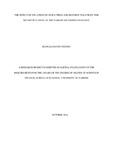| dc.description.abstract | This study investigated the effect of inflation on stock market return and volatility at the Nairobi Securities Exchange. Previous research findings have established the existence of a negative relationship between stock prices and inflation. A correlational research design was employed to establish whether inflation is associated with stock market return and volatility. Specifically, it sought to answer the puzzle on the effect of inflation on the stock return and volatility at the NSE. The study was conducted using monthly time series data on NSE 20 share index and Consumer Price Index, for the period February 2004 to January 2014. The OLS estimation technique was employed to estimate a single equation relationship with the stock return as the dependent variable and explanatory variable as inflation. Regression results in this study indicate that inflation is not a significant explanatory variable for the stock returns. The study reports a negative relationship between stock returns and inflation contrary to Fishers (1930) hypothesis. This study applied the Generalized Autoregressive Conditional Heteroskedasticity (GARCH) model to assess the impact of inflation on stock market return and volatility. In addition, the impact of asymmetric shocks was investigated using the EGARCH model developed by Sentana (1995). EGARCH model results established that NSE stock market returns are asymmetric thus EGARCH was preferred over standard GARCH which does not capture asymmetry. Results show weak but significant support for the hypothesis that bad news exert more adverse effect on stock market volatility than good news of the same magnitude. Furthermore, inflation rate and change in inflation rate were found to have significant negative effect on stock market volatility. However, it was verified that inflation rate itself has significantly higher power of explaining stock exchange volatility than change in inflation whose magnitude is relatively small as indicated by the low value of the EGARCH inflation coefficient. The findings of this study can be helpful to the investors in better understanding the impact of inflation on market risk which helps in selecting the appropriate investment strategy. Measures employed towards restraining inflation in the country, therefore, would certainly reduce stock market volatility and boost investor confidence. | en_US |



